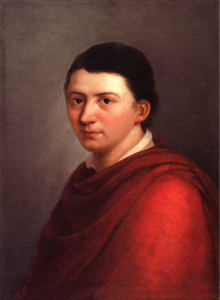The stars
(Poet's title: Die Sterne)
Set by Schubert:
D 684
[probably early 1819]
Part of Schlegel: Abendröte (putative cycle)
Du staunest, o Mensch, was heilig wir strahlen?
O folgtest du nur den himmlischen Mächten,
Vernähmest du besser, was freundlich wir winken,
Wie wären verschwunden die irdischen Qualen.
Dann flösse die Liebe aus ewigen Schalen,
Es atmeten alle in reinen Azuren;
Das lichtblaue Meer umschwebte die Fluren,
Und funkelten Sterne auf den heimischen Talen.
Aus göttlicher Quelle sind alle genommen.
Ist jegliches Wesen nicht eines im Chore?
Nun sind ja geöffnet die himmlischen Tore,
Was soll denn das bange Verzagen noch frommen?
O wäret ihr schon zur Tiefe geklommen,
So sähet das Haupt ihr von Sternen umflogen
Und spielend ums Herz die kindlichen Wogen,
Zu denen die Stürme des Lebens nicht kommen.
Are you humans amazed at our holy beams?
O if you only followed the heavenly powers,
You would understand better how friendly our signal is,
And earthly troubles would then have disappeared!
Then love would flow from bottomless cups,
All would breathe the pure azures,
The light blue sea would encircle the fields,
And stars would sparkle over familiar valleys.
All things are taken from a divine source.
Is each being not one thing in the choir?
Now the heavenly gates have been opened,
What is the use of fearful despair?
If you had already dragged yourself to the depths
You would see stars flying around your head
And, playing around your heart, the childlike waves
Which the storms of life would not reach.
All translations into English that appear on this website, unless otherwise stated, are by Malcolm Wren. You are free to use them on condition that you acknowledge Malcolm Wren as the translator and schubertsong.uk as the source. Unless otherwise stated, the comments and essays that appear after the texts and translations are by Malcolm Wren and are © Copyright.
☙
Themes and images in this text:
Blue Breath and breathing Children and childhood Cups and goblets Doors and gates Eternity Fields and meadows Friends Heads Hearts Heaven, the sky Heavenly choir High, low and deep Open and closed Rays of light The sea Springs, sources and fountains Stars Storms Valleys Waves – Woge
Die Sterne comes towards the end of the second, nocturnal, section of Schlegel’s Abendröte (Sunset) collection, in which the poet is claiming to be able to hear the different voices of nature at the end of the day and that this multiplicity masks a deeper unity that only a sensitive soul can be attuned to. Here the stars address the reader directly, but they use a conditional tone to suggest what they might be able to offer only if we readers and listeners approach matters in the correct way. In Schlegel’s original wording the stars suggest that if the sensitive human were to follow the ‘signs’ (Winken) encoded in starlight, s/he would experience a universe where troubles had vanished and where love would flow endlessly. The second half of the first strophe sets up the essential tension between unity and multiplicity which is the key to such a new way of seeing things. Love (singular) will flow from bottomless goblets (plural). The lightblue sea (singular) will surround the fields (plural). All things (in their multiplicity) will inhale blue azures (what sort of a plural is that?).
The density and obscurity of some of the language is one of Schlegel’s techniques to make the readers feel that it is our fault that we do not immediately ‘get it’. We know that although the stars are shining they are not immediately enlightening us; their voice in this choir is not easily detectable. Schlegel’s language is pushing us to clamber to the depths. It is only there in the darkness that the heavenly gates open for us. Here is that standard image in German ‘star’ poetry: night and darkness as a precondition for seeing the light of the stars (as a metaphor for the way to spiritual enlightenment). We have to go down to the profoudest abyss in order to be aware of the stars flying above our head.
☙
Original Spelling and notes on the text Die Sterne Du staunest, o Mensch, was heilig wir strahlen? O folgtest du nur den himmlischen Mächten1, Vernähmest du besser, was freundlich wir winken2, Wie wären verschwunden die irdischen Qualen! Dann flösse die Liebe aus ewigen Schalen, Es athmeten alle in reinen Azuren, Das lichtblaue Meer umschwebte die Fluren, Und funkelten Sterne auf den heimischen Thalen. Aus göttlicher Quelle sind alle genommen. Ist jegliches Wesen nicht eines im Chore? Nun sind ja geöffnet die himmlischen Thore, Was soll denn das bange Verzagen noch frommen? O wäret ihr schon zur Tiefe geklommen, So sähet das Haupt ihr von Sternen umflogen Und spielend ums Herz die kindlichen Wogen, Zu denen die Stürme des Lebens nicht kommen. 1 Schubert changed the original 'Winken' (signs) to 'Mächten' (powers) 2 Schubert changed 'blinken' (twinkle) to 'winken' (signal)
Confirmed by Peter Rastl with Schubert’s source, Musen-Almanach für das Jahr 1802. Herausgegeben von A. W. Schlegel und L. Tieck. Tübingen, in der Cotta’schen Buchhandlung, 1802, pages 155-156; and with Friedrich Schlegel’s sämmtliche Werke. Erster Band. Gedichte. Berlin, bei Julius Eduard Hitzig, 1809, page 32.
To see an early edition of the text, go to page 155 Erstes Bild 165 here: https://download.digitale-sammlungen.de/BOOKS/download.pl?id=bsb10119478


